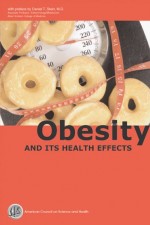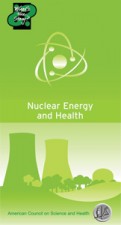 Energy needs worldwide are expected to increase for the foreseeable future, but fuel supplies are limited.
Energy needs worldwide are expected to increase for the foreseeable future, but fuel supplies are limited.
Search results
 Obesity is increasing at alarming rates in our society. While excessive attention to thinness carries its own physical and mental health problems, increasing overweight is a much larger problem in our society and currently affects over two thirds of the population.
Obesity is increasing at alarming rates in our society. While excessive attention to thinness carries its own physical and mental health problems, increasing overweight is a much larger problem in our society and currently affects over two thirds of the population.
Many Americans may be feeling the need to make a fat-fighting New Year's resolution after holiday bingeing. Obesity affects many more aspects of health than is commonly recognized, as described in a new book by the American Council on Science and Health, Obesity and Its Health Effects. In seventeen chapters, each reviewed by an expert in the pertinent medical field, the publication describes how obesity impairs the function of virtually every body system.
A November 1, 2006 piece by Michael O'Riordan mentioned the American Heart Association's skepticism about the trans fat ban and notes ACSH's objection to the ban:
The November 30, 2006 broadcast of the CBS Evening News featured ACSH's Dr. Elizabeth Whelan in a piece on the purportedly addictive power of food:
 New York, NY -- December 6, 2007. Americans are bombarded almost daily with warnings about new health risks -- and advice on how to avoid premature disease and death. Too often, this flurry of advice and warnings blurs the true distinction between real and hypothetical health risks -- and between large and tiny chances of death.
New York, NY -- December 6, 2007. Americans are bombarded almost daily with warnings about new health risks -- and advice on how to avoid premature disease and death. Too often, this flurry of advice and warnings blurs the true distinction between real and hypothetical health risks -- and between large and tiny chances of death.
Parents of infants in sub-Saharan Africa, where a million or more die each year, have new hope, thanks to a group of multinational researchers, led by Dr. John J. Aponte of the University of Barcelona and colleagues from Mozambique. They evaluated a new malaria vaccine's safety and efficacy in 214 infants in rural Mozambique, an area of high incidence of malaria, and found that the vaccine against Falciparum malaria, the most severe form, reduced the rate of new infections by almost two thirds.
A March 13, 2007 piece, explaining why tobacco stocks appear to be benefiting from impending FDA regulation of cigarettes, quotes ACSH's Dr. Gilbert Ross on the status quo-enhancing tendencies of regulation, especially the sort that limits new advertising:
ACSH/Staff, Oprah/Cranks, Meat/Breasts, HRT/Lungs, Sun/Skin, Spice/Island
by Elizabeth Wade
ACSH welcomes two new staffers
We'd like to extend a warm welcome to the two newest members of the ACSH team: art director Anthony Manzo and research intern Curtis Porter. Curtis will be taking over as writer of Morning Dispatch this week, as I prepare to leave to start my Fulbright scholarship in Mexico.
Could watching Oprah be dangerous for your health?
Alternative medicine has once again crept into popular fashion, to the chagrin of legitimate medicine. The only thing that these practices provide is placebos, says ACSH s Dr. Ruth Kava, which is not something most people seek from medical professionals.
ACSH's Dr. Gilbert Ross has noticed the regrettable trend: Despite the fact that there s no such thing as legitimate alternative medicine -- only real medicine and fake medicine -- it seems that more and more people and even doctors are buying into the power of superstition.
School children may be a priority for next flu season s vaccinations, according to Health and Human Services Secretary Kathleen Sebelius. Young people are petri dishes for flu incubation, says Dr. Ross. Last year the CDC decided to focus on kids in order to prevent the spread of flu, and that may be their strategy again, especially if they decide to vaccinate against swine flu.
Obesity seems to be the medical concern of the day. One New York Times article references a study to be published in today s Journal of the American Medical Association that determined that adults who were overweight as teens were twice as likely as similar adults who had never been overweight to develop pancreatic cancer later in life, and people who were obese as young adults were at more than twice the risk of adults who had never been obese.
WHO Director-General Margaret Chan, when asked at a news briefing on Tuesday if there were any signs of the swine flu virus mixing with other strains such as avian flu, responded, The virus is still very stable...But as we all know, the influenza virus is highly unpredictable and has great potential for mutation.
This is somewhat reassuring, says ACSH s Dr. Elizabeth Whelan. At least we know that there aren t any big surprises for the fall flu season, so far.
Researchers from the National Cancer Institute in Bethesda, MD reported that a diet high in fat can increase the risk of developing pancreatic cancer. According to the article from dbtechno.com, this study finding is interesting because it contradicts previous studies that have found the exact opposite.
I ve never heard of any study that would indicate the opposite, says ACSH's Dr. Gilbert Ross, so I don t entirely trust this report. To whatever extent it is true, it s a good reason not to overdo your fat intake.
All the news that's fit to scare. That was the thrust of this weekend's New York Times article by Charles Duhigg entitled "Toxic Waters: Debating Just How Much Weed Killer Is Safe in Your Water Glass."
A few weeks ago, the world of organic food proponents was rocked by new research that organic food was not any more nutritious than conventionally-grown food. Consumers have long been interested in knowing if the extra money they have been shelling out for organic food is justified and the subject, therefore, is of much interest.
A Little Bit of Background
A report published in the Archives of Internal Medicine suggests that Proton Pump Inhibitors (PPIs) like AstraZeneca’s Nexium and Prilosec — which treat inflammation of the esophagus, gastroesophageal reflux disease, ulcers and several other conditions by suppressing acid production in the stomach — can raise the risk of fractures in post-menopausal women and are associated with an increased risk of an uncommon bacterial infection in ho
CBS' 60 Minutes may be known for its investigative news, but on Sunday it failed to thoroughly examine the claims against phthalates, a group of chemicals that help to make plastic flexible. Sunday's segment perpetuates baseless allegations against these everyday chemicals, creating unfounded health scares in homes nationwide.
American Enterprise Institute resident fellow, former FDA official, and friend of ACSH Dr. Scott Gottlieb evaluates the progress made in cancer treatment in today's Wall Street Journal. Gottlieb highlights the results of studies of two experimental drugs presented at this year s annual American Society of Oncology meeting in Chicago.
The President s Cancer Panel 2008-2009 report, Reducing Environmental Cancer Risk: What We Can Do Now, has been highly criticized by the American Chemistry Council. Not surprised you say? What else would a person expect from a chemical group? Well, there s a real hooker here. The American Cancer Society is also critical of the report, which collects seemingly every cancer-scare hypothesis that s been floated over the past 30 to 40 years and suggests that we really ought to be concerned about them.
A dedicated Pop-Tart store joined its candy friends M&Ms and Hershey’s by popping up in Times Square yesterday — but some people aren’t happy about it. Stier appeared on CNBC’s “Power Lunch” to debate anti-obesity crusader MeMe Roth , where he argued that it’s okay to occasionally indulge in a sugary snack as part of an overall balanced diet.
Pagination
ACSH relies on donors like you. If you enjoy our work, please contribute.
Make your tax-deductible gift today!




